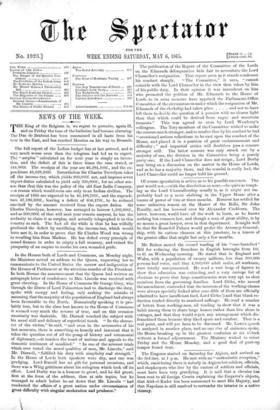The publication of the Report of the Committee of the
Lords on the Edmunds delinquencies bids fair to necessitate the Lord Chancellor's resignation. That report even as it stands condemns his conduct sharply. "The Committee," it says, "cannot coincide with the Lord Chancellor in the view thus taken by him of his public duty. In their opinion it was incumbent on him who promoted the petition of Mr. Edmunds to the House of Lords to in some measure have apprised the Parliament-Office Committee of the circumstances under which the resignation of Mr. Edmunds of the clerkship had taken place . . . . and not to have left them to decide the question of a pension with no clearer light than that which could be derived from vague and uncertain rumours." This was agreed to even by Lord Westbury's. colleagues. The Tory members of the Committee wished to make the censure much stronger, and to resolve that by his conduct he had "occasioned serious reflections to be cast upon the conduct of the House, and placed it in a position of great embarrassment and difficulty ; " and impartial critics will doubtless pass a censure stronger still. The latter censure was only struck out by a majority of one, the division in the Committee being a purely party one. If the Lord Chancellor does not resign, Lord Derby may bring on a discussion on the matter in the House of Lords, and as he has a majority there, and the scandal is really bad, the Lord Chancellor could no longer hold his ground.






























